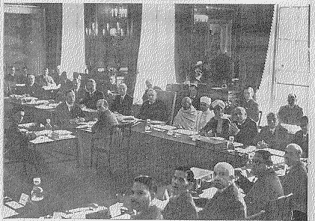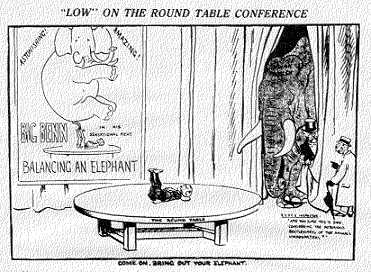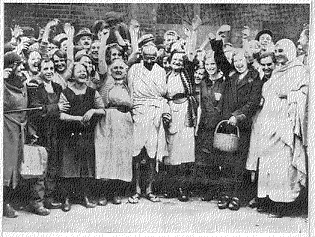
Some men changed their times...
One man changed the World for all times!
Comprehensive Website on the life and works of
Mahatma Gandhi
+91-23872061
+91-9022483828
info@mkgandhi.org

+91-23872061
+91-9022483828
info@mkgandhi.org
Round Table Conference |

Gandhi at the Round Table Conference in London 
David Low on the Round Table Conference On August 29, 1931, Gandhi sailed for England in theSS Rajputana to attend the Second Round Table Conference, He went as the solerepresentative of the Indian National Congress. All the delegates were nominees of theBritish Government; they had a sprinkling of able individuals, but most of them were drawnfrom the princely order, the landlords, the titled gentry and the leaders of communalgroups and vested interests. What with its composition and what with its procedure, which theBritish Government controlled, the conference side-tracked its energies into secondaryissues and particularly the communal problem. Gandhi was prepared to give a "blankcheque" to Muslims and other minorities to remove their legitimate fears, providedthey were willing to press the national demand for freedom. Most of the Hindu delegateswere not ready for this gesture, and the Muslim nationalists were not represented at theconference.  Gandhi in Lancashire, September 1931
Gandhi in Lancashire, September 1931Gandhi pleaded for an honourable and equal partnership betweenBritain and India, held not by force but "by the silken cord of love" He foundthe odds against him. There was a financial crisis and a change of government in Britain;in the new Ministry, the Conservatives were heavily represented. The British public waspreoccupied with domestic issues; for it, the financial crisis was a more urgent issuethan the niceties of an Indian Constitution. Inevitably, even if imperceptibly, there wasa change in emphasis. Sir Samuel Hoare, the new Secretary of State, told Gandhi that hesincerely believed that Indians were unfit for complete self-government. |